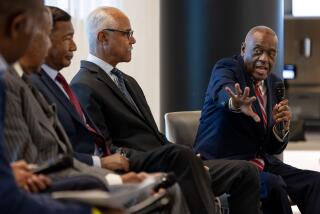Telling It Like It Was
“I wince each time I say it,” says filmmaker Stanley Kramer, referring to “Eleanor Roosevelt’s Niggers”--the name of the book that he plans to make into a movie. “But you have to understand, the men themselves used that term. And they didn’t mean it in a derogatory sense.”
The title is a nickname for World War II’s mostly black 761st tank battalion. It came into being largely because of the First Lady’s campaign to allow blacks to serve in combat rather then being relegated to menial jobs. The men saw plenty of action, including the Battle of the Bulge, and their exploits were detailed in the 1976 book by battalion Capt. David J. Williams, who will be a consultant on the film. Joe Keaney--who will co-produce--says he has spent 10 years trying to get it made.
“I’ve run into every type of opposition,” sighs Keaney, over issues ranging from the battalion’s nickname to industry worries about the commercial chances of a black-themed project.
Keaney ultimately teamed with Robert Guillaume’s Longridge Prods. Then the project made its way to Kramer--who’s known for producing social-issue films ranging from “High Noon” (1950) to “Guess Who’s Coming to Dinner?” (1967), as well as the 1949 title, “Home of the Brave,” about abusive treatment of a black GI by his fellow white GI’s.
“Sadly, too many things haven’t changed since I made that movie,” says Kramer. “ ‘Eleanor Roosevelt’s Niggers’ “--which, with “E.R.N.” is a possible title--”is a World War II story, but, it really isn’t.”
Keaney and Kramer, who will direct and produce, leave early next month to scout locations in Eastern Europe. Production is expected to begin early next year, with a $15-million budget. If his schedule permits, Guillaume (currently in the title role of the L.A. production of “Phantom of the Opera”) will be among the stars. Bob Woodburn is writing the screenplay.
In the meantime, Keaney has met with a representative of the Hollywood branch of the NAACP to garner approval for the project. “They’re highly supportive--they’re familiar with the 761st,” he says, stressing that he still plans to contact the NAACP national headquarters in Baltimore.
“We are aware of sensitivities involved (including possible concerns over the film’s projected title). We are determined to deal with them. But we also believe this story should be told. These guys were valiant Americans. If ‘Glory’ could tell the story of black soldiers in the Civil War, can’t the black soldiers during World War II get their due?”
More to Read
Only good movies
Get the Indie Focus newsletter, Mark Olsen's weekly guide to the world of cinema.
You may occasionally receive promotional content from the Los Angeles Times.










